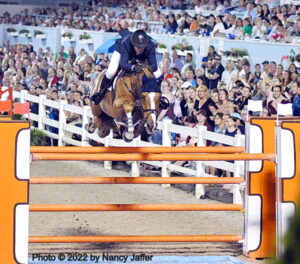
by Nancy Jaffer | Jul 15, 2022
Only one Olympic veteran has been named to the U.S. NetJets show jumping team for the world championships in Denmark next month.
McLain Ward and Contagious will lead the way as Lillie Keenan (Argan de Beliard) and Brian Moggre (Balou du Reventon) will be making their debuts on a championship squad. Adrienne Sternlicht, a member of the 2018 gold medal world championships team, was selected with Cristalline.

McLain Ward and Contagious on their way to winning the Sapphire Grand Prix at Devon last month. (Photo © 2022 by Nancy Jaffer)
Jessica Springsteen, 30, a teammate of McLain’s on the Tokyo silver medal Olympic squad last year when she rode Don Juan Van De Donkhoeve, will be the traveling alternate with RMF Zeclilie. She is a native of Colts Neck, N.J.
Brian, a Texan, will turn 21 Aug. 7 when he arrives in Denmark for the competition, which begins several days later on Aug. 10. In the final observation trial in the Netherlands this month, he was the only U.S. rider to turn in a clear round during the Nations Cup, where the squad finished eighth.
Lillie, 25, a New York City resident who trains with McLain, made her Nations Cup debut in 2014.
Sternlicht, 29, a Connecticut resident who previously trained with McLain, is the only team member who will be riding the same horse she was aboard in the 2018 championship. Cristalline’s best finish this year was fourth in the Sapphire Grand Prix at Devon, which McLain won with Contagious.
McLain at age 46 is very senior to his teammates and has had a stellar career. The Olympic multi-medalist from Brewster, N.Y., won the 2017 Longines FEI World Cup finals with HH Azur and took two classes with Contagious at Aachen this summer.
Show jumping is one of four world championships that will be in Herning, Denmark, this summer. The others are dressage, para-dressage and vaulting. And no, it’s not the World Equestrian Games.
The WEG began in 1990 in Stockholm as a one-off compiled of all the FEI disciplines. It went so well that it continued, some years in better style than others, through 2018 in Tryon, N.C. The very expensive and difficult to present WEG ended after Tryon.
So this year, the eventing and four-in-hand world championships will be held in Pratoni, Italy (just as was the case in the 1998 WEG based in Rome), but they’re far from the four disciplines in Denmark. Endurance will be in Verona, Italy. Reining has been dropped by the FEI so it’s no longer part of the world championships scene.
.
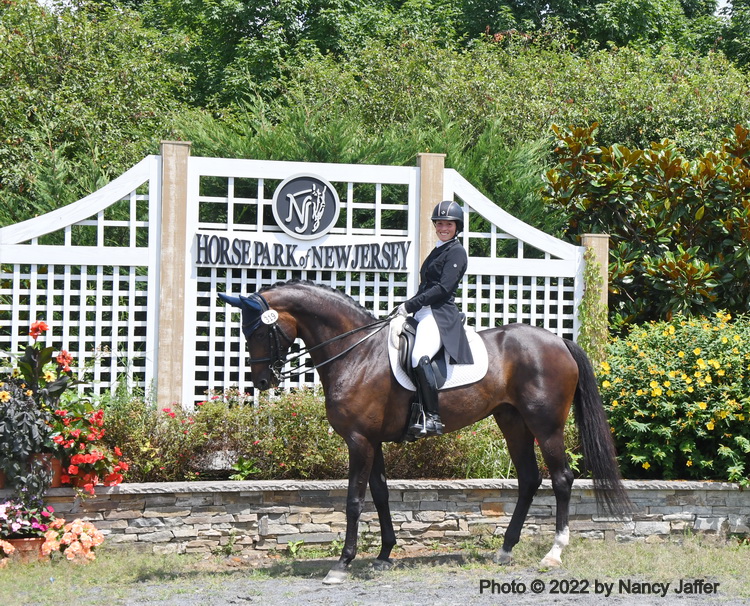
by Nancy Jaffer | Jul 13, 2022
In the nation’s most densely populated state, the Horse Park of New Jersey is a tree-shaded oasis. I think of all the places where I used to compete not so long ago that have been developed or no longer stage shows—Coppergate in Basking Ridge, Tewksbury in Hunterdon County, Gill-St Bernards in Somerset County, to mention only a very few.
So the concept of a showgrounds that is safe from development is very important, especially if you are aware of the multi-breed constituencies it serves. From hunters and jumpers to Standardbred pleasure horses, saddlebreds, Arabians, eventers and a variety of schooling activities, the Horse Park stays busy.
Of course, it can’t be compared to lavish venues such as Wellington International or the World Equestrian Center in Ocala, where private entrepreneurs have spent many millions. There are, however, plenty of other facilities across the country that have state-of-the-art footing and some amenities without the bells and whistles of the big players. But while those involved with the Horse Park never stop trying to do their best, it remains a 30-year-old non-profit that could use some updates.
The Horse Park is awaiting word on a request for $2.5 million from the state that would pay for footing and stabling improvement. But it will be waiting for a while. The legislation for that spending, submitted by Assemblyman Ron Dancer, is now in the state Assembly Agriculture and Food Security Committee for review. According to a spokesperson for Assembly Deputy Majority Leader Roy Freiman, who chairs the committee, the panel will not resume its work until September. Then it has to come out of committee, go to the Assembly and Senate for approval and finally make it to the governor’s desk. It’s a long process, and who knows at this point how the legislation will fare.
Meanwhile, the Kentucky Horse Park has been granted $10 million from the Blue Grass State’s politicians to renovate its stabling. It is seeking feedback from those who have stabled horses there as to what improvements they would like. In Kentucky, there is an understanding of the importance of its horse-related constituency across the board, even as national attention focuses mainly on its racing, highlighted by the Derby and this year’s Breeders Cup. Horse-related activities bring in out-of-staters, helping all kinds of small businesses in addition to hotels and restaurants. New Jersey politicians should pay attention to what Kentucky has done, and why.
Despite the Horse Park of New Jersey’s shortcomings that have kept some trainers away, there are many who enjoy the facility and what it has to offer. I talked to competitors, officials and others during last weekend’s Dressage at the Park show to find out their opinion of the venue.
Trainer Marcus Orlob says, “I love it here,” citing the amount of space at the venue, but he was not happy with the puddles that distracted the sensitive stallion, Spirit of Joy, in his Developing Grand Prix test. Depending on who is managing the rings at the park, Marcus observed, the footing “gets at times deep, or really hard.”
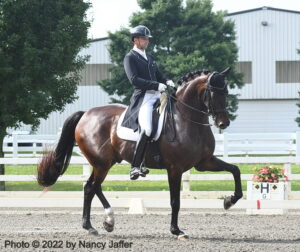
Marcus Orlob and Spirit of Joy. (Photo © 2022 by Nancy Jaffer)
On Sunday, the surface was generally okay, aside from the puddles, he said. But he wondered why the East Ring was watered after a big rain two days earlier. At the same time, he said, the warm-up ring was fine. But the first group of riders bore the brunt of the water mishap.
Co-manager Kathy Grisolia approached Marcus for an assessment and apologized to him, he said. She noted that with the sun coming out, the footing dried up, they would do a drag during the break and “it gets better.” In terms of watering, “it’s a fine balance,” she commented.
Emily Wyman of Hudson, N.Y., a professional who rode her test with Chigali after Marcus had finished, also noted the puddles bothered her horse.
“I know he needs to go wherever and do whatever,” she said, but it presented a problem “especially because it wasn’t consistent.” There was a big puddle at one end and “a bit of puddling” on the long side of the ring, was a factor, she noted.
“They watered a little bit much,” Elisabeth Williams, a former steward who was working at the show as a volunteer, said on Sunday.
“It was a little bit deep this morning, but there is a bottom to it,”
Even so she mentioned, “They’re not slip-sliding around anywhere, even with the heavy rains we had going into Friday.
The show was supposed to have an FEI component, but the 2-star CDI was cancelled when entries were low and there was a problem getting a veterinary official with the required credential.
The July show traditionally is lighter in entries than the Eastern States Dressage and Combined Training show in September. Jennifer Bateman, co-secretary with Monica Fitzgerald, estimated there were approximately 124 entries. Initially, she had expected about 150. Unlike a hunter/jumper show, however, a dressage competition is valid for participants no matter how light the entry because competitors are marked the same way by the judges whether there is only one in the class, rather than 10, and the test comments are a good barometer of where a horse is in its development.
Some competitors were disappointed about the CDI situation because they needed an FEI result to qualify for next month’s national championships in Illinois. Marcus, who received 70 percent in the Developing Horse Grand Prix, is qualified for the championships because that division does not require a CDI score.
Emily entered the show when it was a CDI, with qualifying for the national championships as a goal, and is applying for a waiver to that competition after the CDI was scrapped.
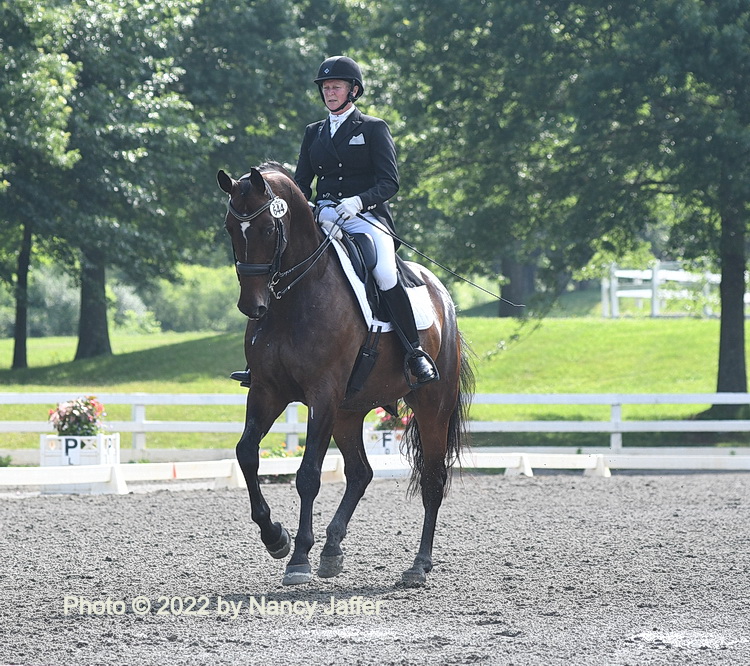
Emily Wyman and Chigali. (Photo © 2022 by Nancy Jaffer)
Marcus rode just after 9 a.m., but as the morning went on and the ring was dragged, puddles disappeared and the footing was not the subject of complaints.
“It’s not fancy footing, but it’s not dangerous, it’s safe. I don’t mind the footing here at all. It’s not slick,” said trainer Lauren Chumley of Pittstown after her 10:55 a.m. ride in the Intermediate I freestyle on Santa Barbara DASH.
Elisabeth observed, “No it’s not the wonderful Global (Dressage Festival) felt footing, but it’s totally rideable. None of the horses are sucking back. There’s enough give in it so they can extend and do all that good stuff. To me, they’re doing a good job on it.”
Marcus, based in Annandale, Hunterdon County, responded to a question about what should be improved at the park in addition to footing by saying he would appreciate more food trucks (“better food” was mentioned by several people) and more vendors. And of course, upgraded stabling, which is what everyone would like. He sees the potential of the park with improvements as a place with the potential of a place “to hang out” for chats and socializing with clients and other professionals
Young Rider Morgan Colliti, 22, a Newtown, Pa., professional, who also did not need a CDI to make it to the championships in her division, is a fan of the park.
“I really like it here. It’s really open. The horses like it because they can see everything,” she said after completing her first freestyle, and noting her Donatalla CF is “pretty okay with water (in the ring) most of the time.”
Another who appreciates the park is Mia Mata Blake.
“Even though the CDI was cancelled, we decided to come anyway, it’s been really good so far,” she said mid-morning.
“The footing’s been fine. They’re doing a great effort for trying to drag it between rides, which we really appreciate. It’s important for horses to stay sound,” said Mia, the head rider for Silva Martin’s stable.
Mia rode 12-year-old Hannah Lu W while Pamela Murphy rode Hannah’s dam, 18-year-old Rosa Cha W.
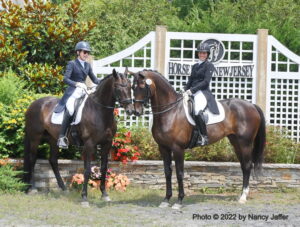
Rosa Cha W and Hannah Lu W have a brief discussion. (Photo © 2022 by Nancy Jaffer)
As is often the case with pre-teen daughters and their mothers, the two mares have their issues. “They have similar personalities,” explained Mia, so the only time they spend together is when they’re trailering to shows. Hannah showed Rosa who was in charge–she was first in the FEI Prix St. Georges while her dam finished third. I can only imagine their horsey conversation on the trailer ride home to Pennsylvania. I heard the remark of equine outrage after they touched noses when they stood together for photos in the Horse Park awards area.
The level of satisfaction seemed to focus on the competitor’s ride time. Those who rode after the early morning classes seemed pleased.
“It’s been a terrific show, the ring’s been fine, the rain helped a lot, they’re dragging it regularly. It’s very well-organized. I’m super happy,” said Sandra Cohen, an amateur who came from New York with her 11-year-old Dutch warmblood, Grace Jones, to ride in the Prix St. Georges.
The park often draws people who are just curious about the horses and their activities, so important in terms of an opportunity for exposing more people to horses. The Garret family of nearby Manalapan, for instance, dropped by to watch because their daughter, 6-year-old Brielle, likes horses. They were unfamiliar with dressage, so one of the very nice volunteers answered their questions. Brielle’s parents, Lindsay and Scott, decided to come after Brielle’s grandparents made a trip to the park and recommended it.
Lori Kelly of Hillsborough, N.J., was among the several vendors in the park’s pavilion with her booth of Waldhausen products. The brand sponsored the Brentina Cup at the show.
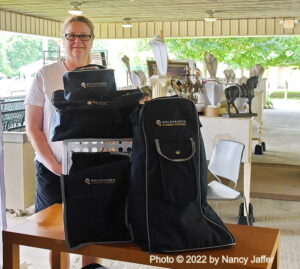
Lori Kelly at her Waldhausen booth in the pavilion at the Horse Park. (Photo © 2022 by Nancy Jaffer)
“The quality of the rides was great, but I don’t think the exhibitors showed appreciation for us being here. It’s not that they need to buy something, but just walk through and humor us,” said Lori. She mentioned, however, that one exhibitor did just that saying “Thank you so much for being here,” and the sponsorship.
“That means a lot to us,” Lori observed.
Elisabeth Williams feels the park has potential. She’d like to see better judges’ booths for the dressage, since it rains into the current open-sided booths, and mentioned the need not only for better stalls, but also for a few that are 12 by 12 for the bigger horses, instead of 10 by 10.
She feels that acting park president Ellen Brindle Clark “has the vision and runs enough shows to know what’s needed. Management is great and they’re really trying. There are different groups here running different competitions, and I think maybe a little more cohesiveness might be nice.”
Former U.S. Dressage Federation President Lisa Gorretta of Ohio, who was the show’s technical delegate, commented after the competition ended that she was impressed by her first visit to the park.
“It has a wonderful atmosphere. I love the `chi,’” she said, referring to its energy.
“It has extremely dedicated horse show and professional staff that do everything they can with the facility they have. The volunteers have been awesome to work with. These guys I think are doing a remarkable job, looking at the footing, trying to figure out what the weather is going to do They really are dedicated to making Mother Nature as cooperative as possible.”
As Lisa noted, it is important to stage 2-star level shows where horses, riders, officials and volunteers all can develop their skills.
“We have to have the farm team of horse shows,” she stated, explaining, that offers “opportunities for people to compete at approximately the level where they are comfortable and bring the standards up all around that.”

by Nancy Jaffer | Jul 9, 2022
As a kid, Lauren Chumley didn’t have a pony. The family wasn’t into horses, and her parents weren’t paying for her to ride.
But as Lauren pointed out, “Little girls that like horses are going to like horses, whether you have horses or not.”
Her enthusiasm wasn’t going to be denied, so she took the route of many other little girls and got a Breyer model horse. First one, then about 299 others.
With the exception of a Clydesdale that proudly stands on the mantel of her Pittstown, N.J., home, her collection now lives in boxes, treasured keepsakes stored away but not forgotten.
“I liked the realism of them, the different breeds, I liked the educational aspect,” the trainer said explaining her childhood involvement. Breyers fascinated Lauren during her non-riding days because she enjoyed reading about all the different breeds represented, along with the history of the real horses depicted.
“Breyer did such a good job. I just ate all of that up,” she recalled. “It was my only access to horses.”
These days, she runs barns at two locations (“I still have too many horses,” she chuckles) where her business involves training, selling and competing 60 of them. And wouldn’t you know it, more than warmbloods are in the mix.
She used to work for a Norwegian Fjord breeder, so it’s no surprise to see her on one of those intriguing individuals. But her best-known horses include a Morgan, Avatar’s Jazzman, who does dressage and evented, as well as Nikolas, a buckskin German riding pony who is a dressage specialist.
Both are made famous by becoming Breyer models, but Nikolas has been elevated to new stature by being named the 2022 Celebration Horse for Breyerfest, July 15-17 at the Kentucky Horse Park, and on the livestream as well. He’s also the program’s coverboy.

Breyerfest took a break from running as an in-person event during Covid, so the 33d edition marks the first time in two years that fans are welcomed to the horse park in Lexington for the event, entitled Breyerfest: Prost!, meaning “cheers” in German. Of course the German theme was a natural for Nikolas as a centerpiece. To carry out the concept, there’s an Oktoberfest tent, complete with polka band and beer Garden.
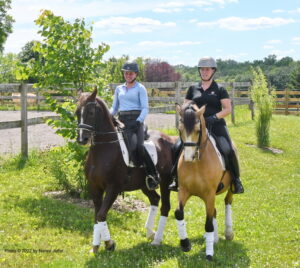
Jazz and Nik will be performing together at Breyerfest. (Photo © 2022 by Nancy Jaffer)
Nikolas and Jazzman, both owned by Melissa Dowling, are appearing together at Breyerfest, doing a Grand Prix pas de deux with Lauren’s assistant, Jessie Hayes, on the Morgan. They are available for autographs and photos as well.
The duo is among 200 equines brought in for Breyerfest, which also offers numerous exhibitions–including Sylvia Zerbini and her lovely troupe of white horses.
Crafts and vendors fill out the offering, while a live broadcast studio brings the event to 128 different countries for those who aren’t among the 35,000 people from all 50 states to come there in person.
Stephanie Macejko, vice president of marketing and product development for Breyer’s parent company, Reeves International, noted it is unusual that someone has had two of their horses become models.
She explained, however, “When we were looking for a horse a little bit different for our celebration model,” Nikolas emerged as the perfect choice for the Celebration horse, which comes with an all-access ticket to Breyerfest on site, or with traditional online access.
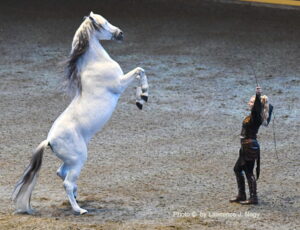
Sylvia Zerbini and her white horses will be part of Breyerfest. (Photo © by Lawrence J. Nagy)
“He was really unique, ” she pointed out.
“He sort of fit the bill; the German theme, his beautiful buckskin coloring. And Lauren we had known from doing Avatar’s Jazzman.
But there’s more to the selection than looks.
“One of the key aspects of being a Breyer Celebration Horse is they have to be good around people,” said Stephanie.
The Breyerfest experience is “very hands-on for the kids. It gives kids and adults an opportunity to meet their horse heroes, get their photos taken with them and talk with their owners and trainers,” she noted.
“It’s great to see kids having the opportunity to get the exposure to the horses.”
Having models made of the horses she rides has great meaning for Lauren.
“Jazzman was the first one, he’s a special guy. I thought it was really cool that he’s immortal now. There will be kids who are never going to see him who will know who he is. Maybe somewhere out west, or who knows where, some kid will read about Jazzman and the crazy stuff that we did. Who doesn’t want to make their special horse immortal?” Lauren asked.
She likes the idea that kids will recognize Nikolas the way they have recognized Jazzman because of the model.
“Oh my God. Is that Jazzman? Can we take a picture?” kids say when they see her with the Morgan at a show.
“It’s kind of fun,” she said.
Nik, who is 11, did his first Grand Prix last year. She is hoping to take him to Dressage at Devon this autumn, but notes that he’s still green at it and there’s more work to do.
“Just because you start Grand Prix–as I describe it to people–it’s like you finally cross the desert and you arrive at the other side. And then you realize you’re at the base of Mt. Everest; you’re not even halfway done!”

Avatar’s Jazzman with Jessie Hayes and Nikolas with Lauren Chumley stand by their models. (Photo © 2022 by Nancy Jaffer)
She has the encouragement of Alice Tarjan, her best friend, who is short-listed for August’s dressage world championships. In turn, she has groomed for Alice at Aachen last year and Rotterdam this summer.
“I am so happy to be able to help at all,” she said. “It’s an honor and privilege to go to those shows with her and help her out.”
So will there come a day when Alice will be grooming for Lauren at a big show?
“It would be my life goal that I could be good enough that Alice has to wrap my horse for me,” Lauren said with a chuckle.
Lauren didn’t start riding until she was 12, when her grandmother hit her 40s and decided she wanted to ride. She took Lauren with her to the stables at the Quantico Marine base in Virginia, where her husband was stationed.
“My parents are still mad at her. She was taking lessons and I tagged along and that was the end of it,” Lauren said. After that, she started taking lessons at home and “everything snowballed from there.”
The model of Nikolas was created by artist Brigitte Eberl of Germany. It’s a brand new sculpture from the woman who has produced likenesses of such dressage stars as Valegro, Salinero and Totilas.
“I usually tap Brigitte when we’ve got a particularly high-end dressage horse or a horse of the Olympic disciplines,” said Stephanie, noting that Brigitte, who also does bronze work, will have an exhibit at Breyerfest.
Jaime Potkalesky, who handles events for Breyer, notes Breyerfest will have a bigger footprint than ever, with many more model horse shows. People are glad to return after Covid, she said, noting many have posted along the lines that ” We cherish this year because we’re so lucky to be back and so lucky to be able to keep getting together with our friends.”
On the virtual side, “This will be the first time ever that people who can’t make it to the horse park will be able to experience what it’s like. It’s as close as you can get without being there,” she said.
Having her horses represented in the Breyer collection means a great deal to Lauren, who saved her money from babysitting, dog-walking and mowing grass to buy more models when she went to Breyerfest in her youth. Once at the event, she would stand on line for hours to get autographs, and now it’s her autograph that’s being sought.
Asked how she would have reacted if a time traveler could have told the horseless Lauren that in the future, her horses would be Breyers and that one of them would be on the cover of the Breyerfest program, Lauren responded, “I would have thought you were crazy.”
Isn’t it nice when reality turns out to be even bigger than a dream?
by Nancy Jaffer | Jul 7, 2022
The Interscholastic Equestrian Association which offers competition opportunities to equestrians in grades 4-12, is adding something for adults.
During the organization’s 21st season, which begins next month, adult amateurs 21 and older can take advantage of a pilot program that provides a horse and tack, reducing the cost of being involved in competition–especially since participants don’t need to own a horse. It’s similar to the way collegiate league programs operate.
All adult riders must become members of the IEA and be associated with an IEA coach. Adult rider members will participate as individual participants only and not as part of a team. The Adult pilot program includes Hunt Seat, Western and Dressage, with three class options for each discipline.
Adult riders will not be limited to the number of competitions in which they may participate. Unlike the situation with youth riders, points will not be earned and therefore no post-season competitions will be held. Results of adult classes will be collected and posted to the IEA website throughout the regular season this year.
The Adult Pilot Program is optional for any returning IEA team. More information can be found in the IEA 2022-2023 Rulebook under Adult Pilot Program Addendum.
The IEA 2022-2023 regular competition season runs August 2022 through May 2023, depending upon discipline. Adult rider applications will be made available on the IEA website later this month on the Membership Page.
Want to know more? Contact the following IEA Adult Pilot Program Coordinators: For questions regarding competitors, coaches or membership: Jennifer Eaton – jenn@rideiea.org or call 1-877-RIDE-IEA ext 203. For show managers with questions about hosting adult classes: Emily David – emily@rideiea.org or call (814) 207-2603.
by Nancy Jaffer | Jun 6, 2022
Pay attention to this story, because what you do with your horse could be misinterpreted by people unfamiliar with (or even hostile to) equestrian sports. Remember that everyone has a video camera in their phone and can share their videos on line. Take time to think how others will view your interaction with your horse.
A little more than a month after a study group from the French National Assembly offered 46 recommendations toward making Paris 2024 “the Olympic Games of Equine Welfare,” the FEI has formed an independent commission that will allow it “to address current and future concerns related to the use of horses in sport.”
Several organizations noted the suggestions from the lower house of the French Parliament for the most part already are covered by FEI rules. However, some ideas of the National Assembly are worth consideration, including four-member teams for the Paris Olympics (sadly, not happening) and having the team show jumping run before the individual competition at the Games, the opposite way of how it was done in Tokyo last year.
But other suggestions include forming a committee that can roam the Olympic venue at will to check on welfare; regulation of tack (including draw reins and nosebands) and calling for all obstacles on cross-country to be designed to collapse in connection with a fall or impact.
In response to my query about how the French National Assembly’s proposal is regarded, the European Equestrian Federation said it “supports the FEI in this matter, whereby the FEI confirms that many of the recommendations proposed are already in the FEI Rules. We believe that the FEI Rules and Olympic and Paralympic Regulations and the operations are guaranteeing horse welfare at the highest level.”
The International Olympic Committee told me, “Animal welfare is of the utmost importance for the IOC. We understand the International Equestrian Federation (FEI) has had discussions with the French National Assembly and has confirmed that many of the recommendations proposed are already in the FEI Rules. The FEI is working closely with the Paris 2024 Organizing Committee to guarantee horse welfare at the highest level, operationally and in line with the FEI’s Rules and the Olympic and Paralympic Regulations.”
Even so, the FEI obviously feels the need for greater measures, saying its new commission will “develop a practical framework that will allow the International Federation to address current and future concerns related to the use of horses in sport.”
As FEI President Ingmar De Vos explained, “In our industry, Social License to Operate (SLO) is the term given to society’s acceptance of the practice of equestrian sport and all its related activities.”
There is a need to “future-proof” sports that are more than ever under public scrutiny. In making their recommendations, the French National Assembly cited incidents that marred the equestrian disciplines of the Tokyo Olympics, gaining unwanted attention from the public and media. At least one animal rights organization called for a ban of equestrian events at the Olympic Games.
The incidents mentioned were the death of a Swiss horse on cross-country, an Irish show jumper’s nosebleed and the German women’s pentathlon coach punching a horse that had refused a jump. The FEI has no influence over pentathlon; that’s not one of its sports. After 2024, show jumping will no longer be part of the pentathlon, anyway. But the situation could be improved by allowing only one rider per horse and lowering the fences, as called for in the French National Assembly suggestions..
“Equestrian sport and the FEI’s activities are more than ever under public scrutiny and through the commission, we want to embrace that scrutiny to drive change and shine the spotlight on our number one stakeholder – the horse,” said the FEI president.
“There are comprehensive systems and mechanisms in place to protect the welfare of the horse, but there is more that can be done, and more that must be done. And in an ever-changing society, where perceptions shift and norms evolve at an increasingly fast pace, the FEI must address these concerns and criticisms from society and within equestrian circles in a clear and transparent manner.”
A lot of this is public relations. You’ll remember how two-time Olympic eventing gold medalist Sir Mark Todd wound up with a suspension from British racing (he’s a racehorse trainer now) for using a branch to urge an event horse in a clinic to go into a water obstacle. He didn’t bash the horse with it, but even a gentle push looks awry to people who don’t have a knowledge of horse sports.
The FEI president sees the commission as a way “to move forward with a course of action that will strengthen equestrian’s place in society.”
The 10-person commission will be chaired by Natalie Waran, an internationally respected equine welfare expert, a professor at the Eastern Institute of Technology in New Zealand.
She is among the five members of the Commission considered as external to the FEI, with their selection based on consultation with equine welfare and veterinary groups, while the remaining five members represent the FEI and have been selected for their experience, specific area of FEI responsibility and to provide the athletes’ and officials’ viewpoint.
“By being willing to look to the horizon, and address current and future challenges in relation to equestrian sports’ Social License to Operate, as well as to view change as a force for good, the FEI and its member organizations will provide the leadership required to help future-proof equestrian sports,” she said.
The first meetings of the commission, which has yet to be formally named, will take place this month. The commission is expected to work over an initial period of 18 months, with an interim report to be presented at the FEI General Assembly in November 2022 in Cape Town (RSA), followed by a second report at the FEI Sports Forum in April 2023 and a final report/framework to be submitted for approval at the FEI General Assembly 2023 in Mexico.
Members include external experts Kathalijne Visser-Riedstra, Professor (UAS) Human-Animal Interactions at Aeres University of Applied Sciences in the Netherlands; Camie Heleski, senior lecturer, College of Agriculture, Food and Environment, University of Kentucky; Madeleine Campbell, External Expert, Senior Lecturer in Human-Animal Interactions & Ethics at the Royal Veterinary College University of London and Jessica Stark, World Horse Welfare Communications & Public Affairs Director.
Others on the commission who are connected to the FEI are Theo Ploegmakers, European Equestrian Federation President and FEI Board Member; Cayetano Martínez de Irujo, Spanish jumping rider, International Jumping Riders Club; Ken Lalo, CAS Arbiter, former Chair of the FEI Tribunal, president of the Israeli Equestrian Federation; Sabrina Ibanez, FEI Secretary General, APSO President and Cesar Hirsch, FEI Judge and Steward Level 3 and President of the Pan American Equestrian Confederation (PAEC).
Ex Officio: Administrative and Logistic Support: Francisco Lima, FEI director governance & institutional affairs, Barbara Rodel, manager FEI President’s Office, top partner Longines
by Nancy Jaffer | Jul 5, 2022
Six barns in Hunterdon County, N.J., will be featured on a July 24 tour sponsored by the Tewksbury, N.J., Historical Society and the Tewksbury Trail Association. The barns are an assortment of old and new, some located on working arms with animals, some left as they were and others with updated entertainment spaces.
There are only 300 tickets, which are available in advance until July 23. Ticket pickup is at society Headquarters
60 Water St., Lebanon (Mountainville), NJ 08833. Tickets run $30 for adults, $5 for children ages 11-18 and 5 each and children ages 10 and under are admitted free.
If tickets are available the day of the tour, they can be picked up at the society headquarters. If you do it that way, they run $35 each for adults and $5 for children 11-18. Children 10 and under are free.
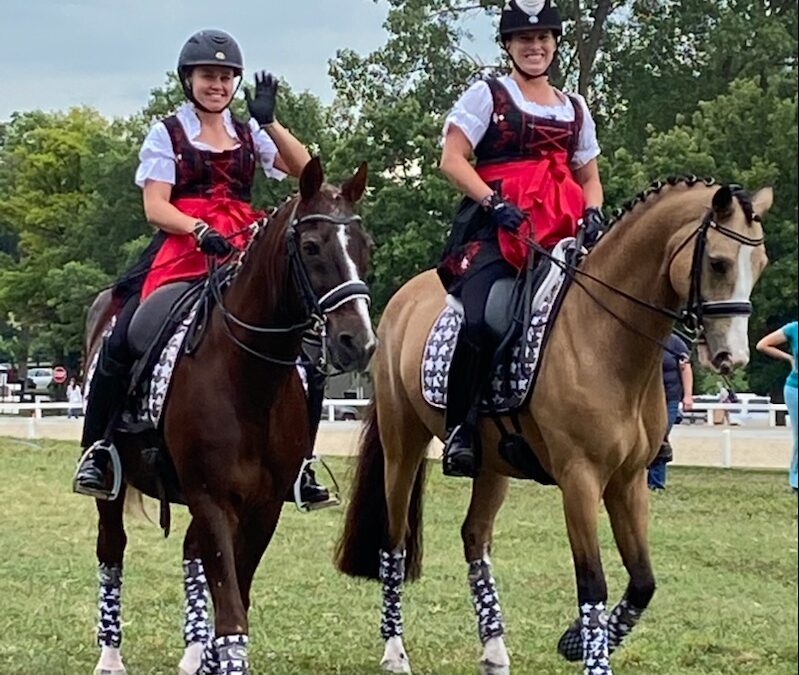
by Nancy Jaffer | Jul 18, 2022
You can’t ride them, but you also don’t have to feed them, muck out or pay veterinary bills for them.
Yet there’s much more to the popularity of Breyer horses than simply ease of ownership. Their sheer variety and beauty stimulates the imagination to rides of fantasy, a way to channel love of horses when the real deal isn’t available.
The annual festival for these models is Breyerfest, which ended its three-day run yesterday at the Kentucky Horse Park, where 35,000 people made a pilgrimage to participate. There were another 26,000 visitors on line , with more than 65,000 site visits. Visitors consumer more than 26,000 hours of content, which included many live equine performances.
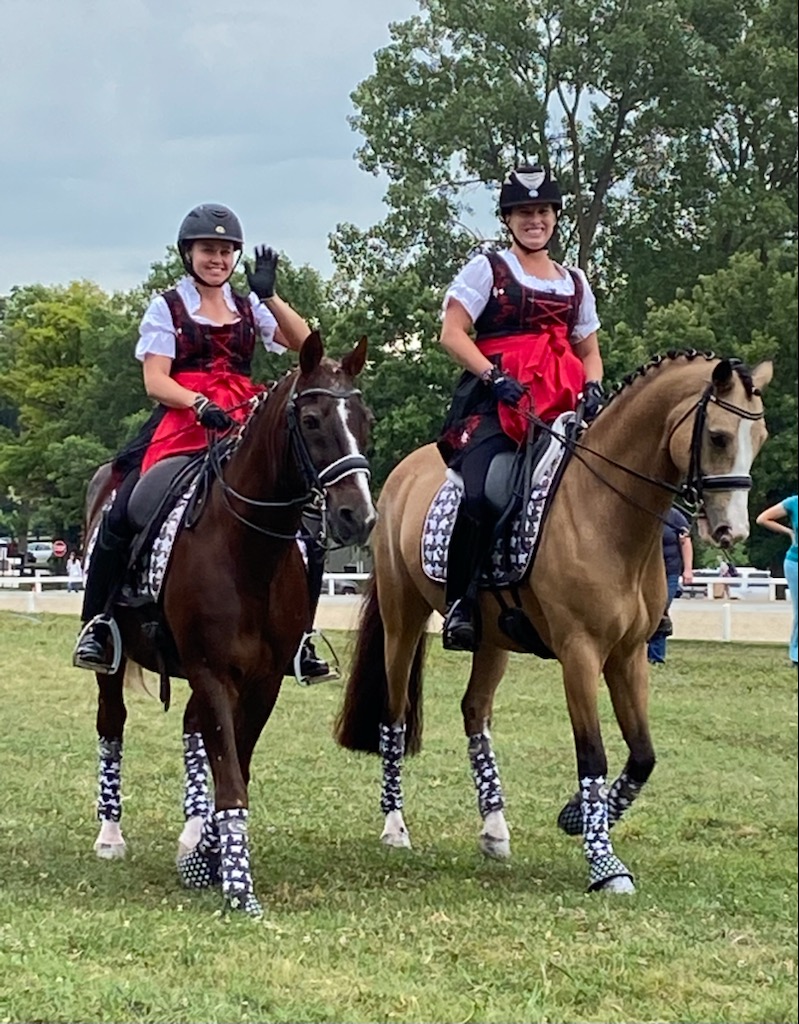
Jessie Hayes on Avatar’s Jazzman and Lauren Chumley on Nikolas. (Photo courtesy of Breyer)
They included a pas de deux to German techno pop music by Lauren Chumley on the buckskin German riding pony Nikolas, the “Celebration” horse for the German-themed festival, and Lauren’s assistant, Jessie Hayes on Avatar’s Jazzman, the Morgan who was the model for previous Breyer issue. (Read more about Nikolas and Jazzman in the second feature at the bottom of the page on this website. Here is a link.)
Hundreds of people lined up to buy the model of Nikolas, released at Breyerfest. Their interest in a collectible is justified by the record price, $65,000, that a model of Glossy Dun Silver Pegasus brought at auction during the event.
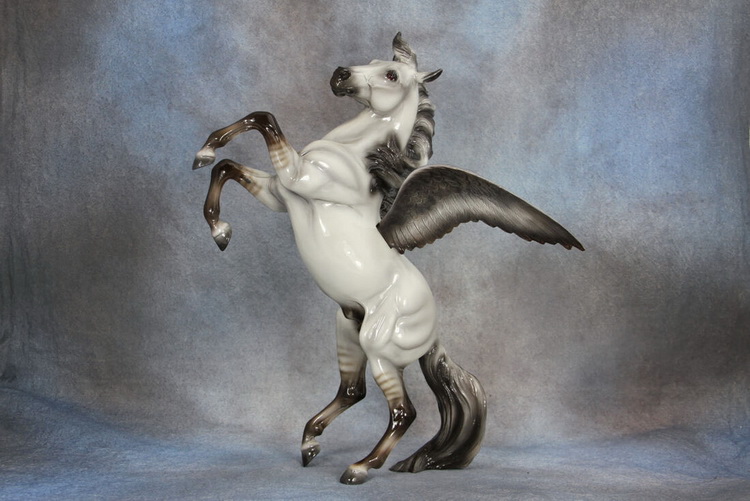
The $65,000 Pegasus. (Photo courtesy of Breyer)
So while a Breyer may be a toy, or something for the mantelpiece, someday you may also be able to think of it as an investment if it’s in good condition. (Hint: Keep the box.)
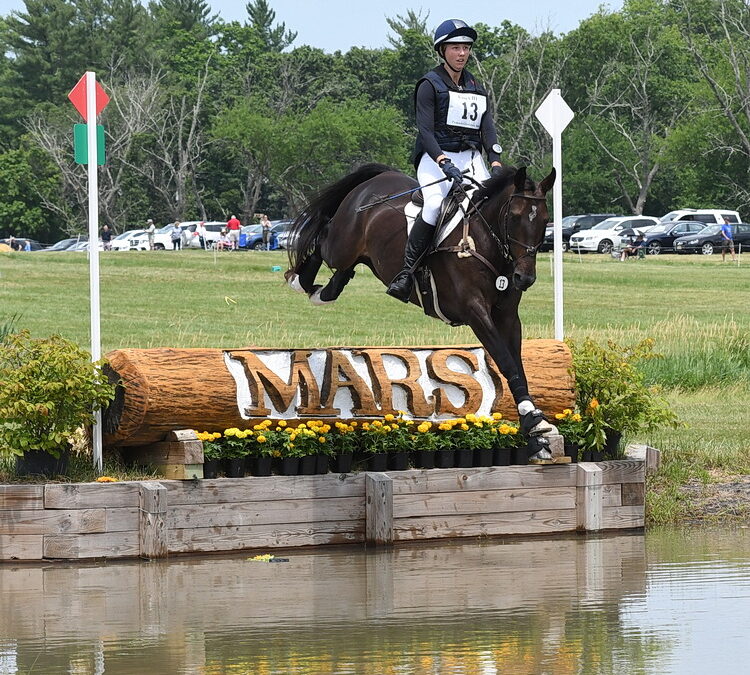
by Nancy Jaffer | Jul 2, 2022
If anyone had the pedigree to win the Open Preliminary section at the Essex Horse Trials, it was Isabelle Bosley. She knows Moorland Farm, where the Essex cross-country was held today, after dressage and show jumping were staged yesterday at the U.S. Equestrian Team Foundation, just down the road in Gladstone, N.J.
Moorland, in Far Hills, is also the site of October’s Far Hills Race Meeting, and Isabelle’s father, Lewis Bosley, is a former steeplechase trainer. Her uncle, Johnny Bosley, was a jockey, and Isabelle even did some steeplechasing before deciding to focus on eventing.
Isabelle, 25, works for top-level rider Lillian Heard. It is her third season on Karen Martin’s homebred Hanoverian, Paper Doll. The mare is only 15.1 hands while Bosley stands 5-10, but the combo has been working over the last three years as the horse has developed into a “cross-country machine.”
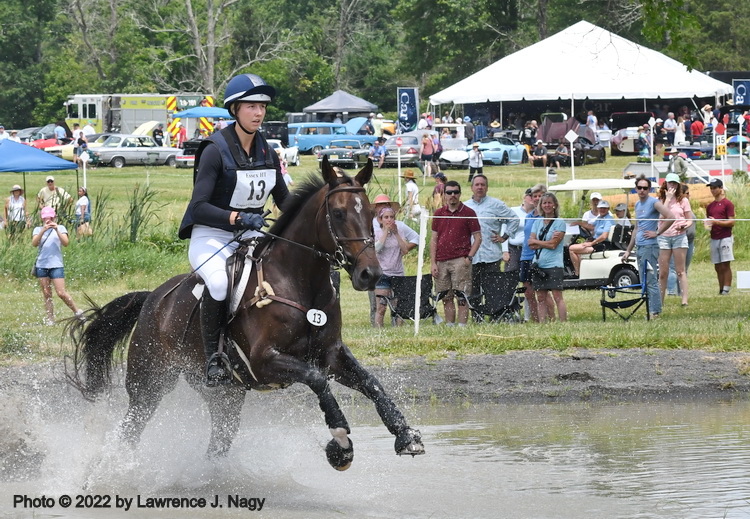
Isabelle Bosley was cheered by tailgaters as she was on the way to winning the Open Prelim at Essex. (Photo © 2022 by Lawrence J. Nagy)
The rider had extra motivation after competing her own horse, the Irishbred Night Quality, on the U.S. Under 25 Nations Cup Team at Houghton Hall in England last spring. That didn’t go as well as she hoped, but the native of Maryland said “it definitely put a fire in my belly a little bit,” calling the trip a great learning experience as she continues to aim for the top of the sport.
She noted both Night Quality and Paper Doll foxhunted and show jumped, which prepared them to do well on cross-country, giving them a natural feel. Third to last in the jump order, Isabelle knew the course designed by Essex co-organizer Morgan Rowsell was a challenge. Five riders in Open Prelim fell, retired or were eliminated. All three entries in the Preliminary Rider section who went out on cross-country failed to finish. Yet Isabelle had faith in her mount.
“Everything on the course was things I’ve seen before with her. So I knew as long as I stuck to my plan with the ride, everything should be all right. I thought she’d be a little spooky at that jump into the water,” said Isabelle, noting that was the biggest drop in water she’s done.
“But she jumped it really big and really carefully. I was thrilled with how she took it on, especially with the heat,” said Isabelle who had been concerned that temps in the high 80s might have tired her mount.
She finished on her dressage score of 22.1 penalties, going from second to first as she claimed the lion’s share of the $10,000 purse for the division.
Things didn’t go as well at the water for the overnight leader, Hannah Sue Hollberg on Stakkato Bronx, who had a refusal at the first element. Ironically, the entry to the complex was over a log with Mars carved into it. Mars Equestrian is a sponsor and Hannah Sue’s gelding is co-owned by Jacqueline Mars, who often attends Essex but was not on hand this time.

Hannah Sue Hollberg and Stakkato Bronx led the Open Prelim division through dressage and show jumping, but a refusal cross-country dropped them to sixth. (Photo © 2022 by Nancy Jaffer)
Hannah Sue, who won the Essex Open Prelim last year with Wacko Jacko, went to the top in dressage with a 20-penalty score and stayed there after going clean over Sally Ike’s well-planned show jumping course last night.
But the refusal and time faults put the Pan American Games medalist sixth on a score of 46 after being penalized for the stop and going over the 5-minute, 47-second optimum time.
Sara Kozumplik Murphy, a two-time winner of the Devon, Pa., eventing derby, moved up to second from third on her 25.9-penalty dressage score after going clear on cross-country with Devil Munchkin.
The horse is owned by Sable Geisler, who names all her horses Munchkin with a different prefix.
“She has one named Evil Munchkin that is also a lovely horse,” said Sara. To each his own…
Sara noted most of her horses don’t event in the summer, but she called Essex “a good opportunity to come here to a special venue. I knew the ground would be great.”
And, she pointed out, “You get to ride at Gladstone, they’ve got prize money. It’s pretty special.”
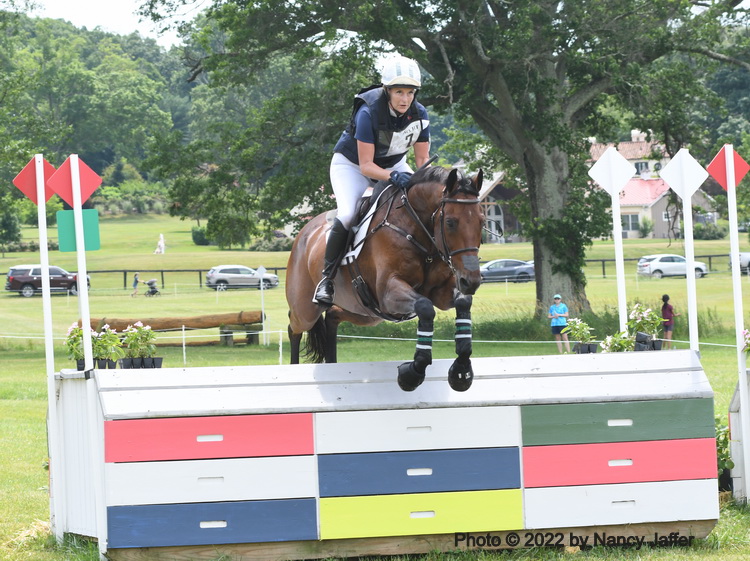
Open Prelim runner-up Sara Kozumplik Murphy with Devil Munchkin. (Photo © 2022 by Nancy Jaffer)
She also noted it was an opportunity for her groom, Sara Kelson, to compete her horses.
The runner-up said it was good for her groom to “practice under pressure,” with the atmosphere and the VIP tent next to the show jumping ring, which is something you don’t normally find at Preliminary. She also cited the “beautiful old turf” at Moorland which offers a good surface when other courses may get hard in the summer heat.
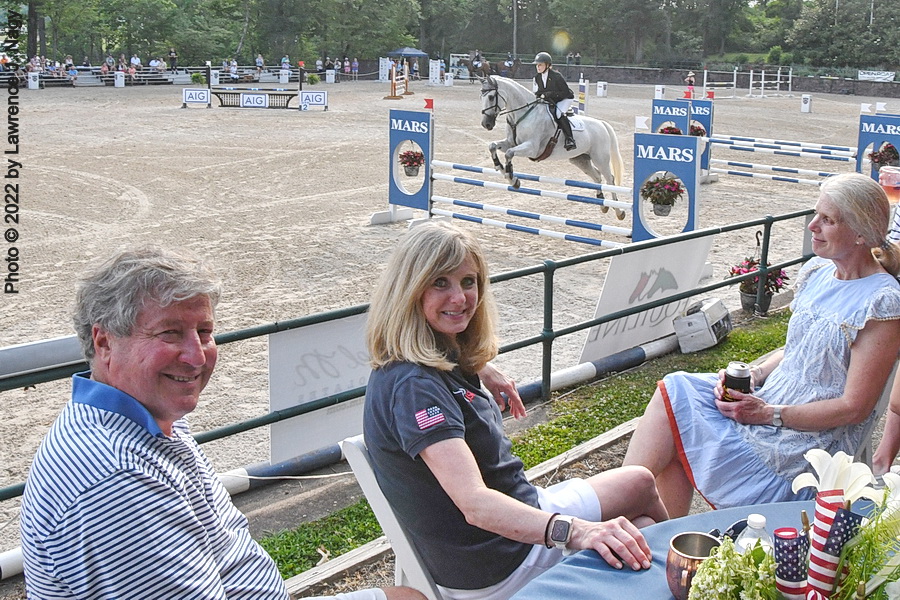
Watching the action in the VIP tent were Essex co-organizer Ralph Jones and his wife, Lynn (right) and the U.S. Equestrian Team Foundation’s Maureen Pethick. (Photo © 2022 by Lawrence J. Nagy)
Sara praised Sally Ike’s show jumping course, saying “it wasn’t a big show jumping, but she was smart, because of the atmosphere, she made it a little more technical but nothing was massive.”
For his part, Morgan didn’t want the Preliminary cross-country to be too easy, noting it was a prize money division.
“I think people came away with some education” and a real idea of where their horses were in terms of their development.
“You have to be scopey to do this course, forward and balanced.”
He was concerned that the riding was “a little suspect” in the show jumping phase in some instances, and you could see that there might be trouble ahead on cross-country.
But as Morgan noted, “If we give them an easy go at this level, then they get to a level where they can really get themselves into trouble.”
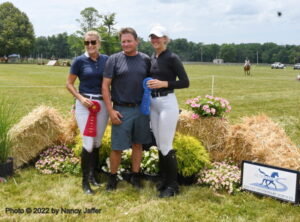
Sara Kozumplik Murphy and Isabelle Bosley with Morgan Rowsell at the prize-giving. The division’s $10,000 prize money was courtesy of Running S Veterinary Services. (Photo © 2022 by Nancy Jaffer)
This was the first year for the two-venue approach, conceived because Moorland doesn’t have all-weather footing for dressage and show jumping, while the USET Foundation doesn’t have room for a cross-country course.
The riders loved it, and he expects the same approach will be used next year.
“It’s nice because you get a bit more atmosphere,” said Isabelle, noting it’s nice to have “crowds all around…so they’re (the horses) not shocked when they get to a big venue. You get the best of every phase.
“The footing for dressage, the nice fancy show jumping ring and then you get the awesome cross-country course the next day.”
Spectators swarmed the cross-country course, with private parties in tents around the water obstacle.The heat offered an opportunity for dogs to cool off in the water between horses. But several riders got dunked involuntarily.
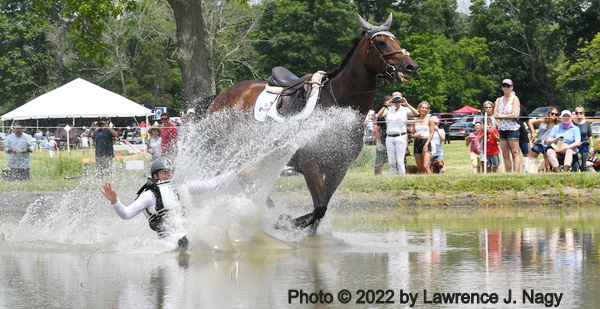
Meg Kepferle got an unwanted shower when she fell from Cooley Renegade, but she was a good sport and took a bow when she got up. (Photo © 2022 by Lawrence J. Nagy)
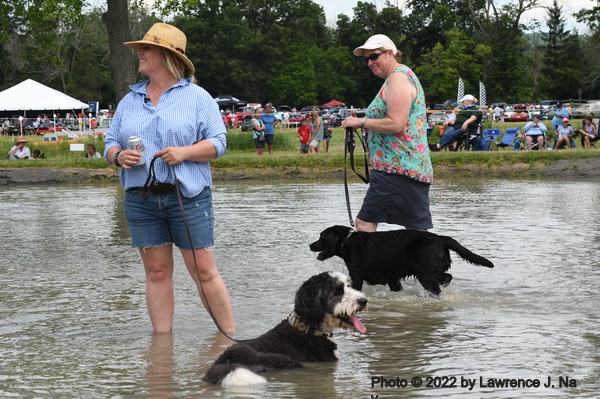
Alicia Hitpass with Duke, her Bernadoodle and Kim Horn with Ginny the Labrador cool off in the water obstacle. (Photo © 2022 by Lawrence J. Nagy)
There also was a car show in memory of Peter Chesson. It featured scores of special vehicles, antique and otherwise, all as well-groomed as the horses.
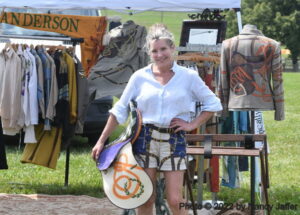
Amy Anderson and her stylish saddle. (Photo © 2022 by Nancy Jaffer)
Shopping was a feature as well. One of the more unusual boutiques featured the clothing that was hand-painted by Amy Anderson. A special item was a saddle that had suffered dry rot. But after Amy’s attention, it is now a thing of beauty.
As Morgan noted, “it does take an army to pull this off,” citing among others, Guy Torsilieri and Ron Kennedy of the Far Hills race meeting organization. He also mentioned that “the volunteers are amazing and really make this event what it is.”
Eastern States Dressage and Combined Training Association President Holly Cornell observed, “This is quite a big deal to the region.” She likes the addition of Gladstone to the Essex equation.
“I think it was a great idea, because the rings here are beautiful and everybody likes to ride at the U.S. Equestrian Team (Foundation) headquarters.”
For complete Essex results, click on this link
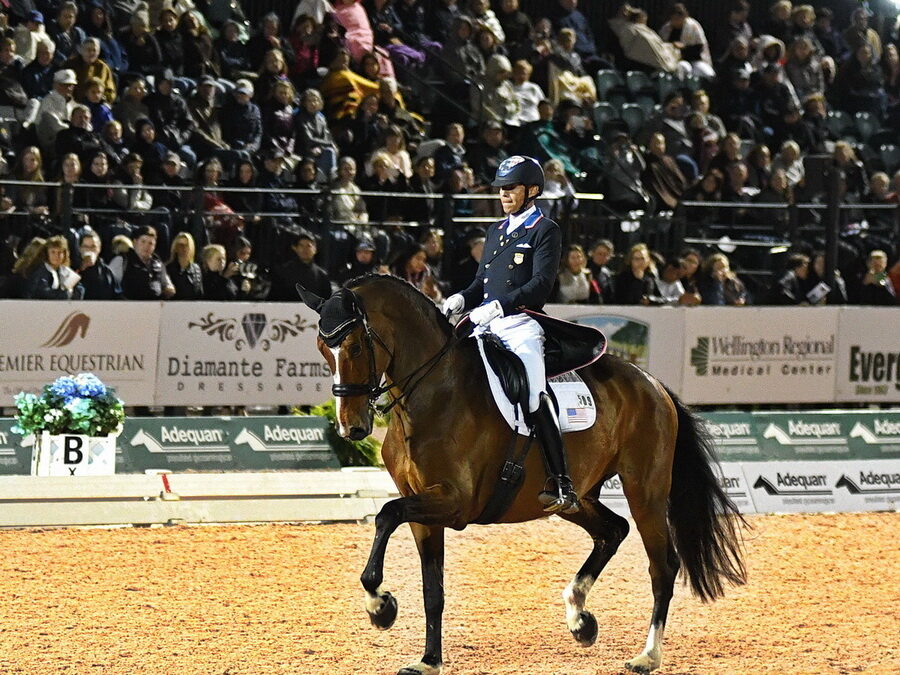
by Nancy Jaffer | Jul 19, 2022
You had to figure that Olympic and world championships medalists Steffen Peters (Suppenkasper) and Adrienne Lyle (Salvino) would make the Dutta Corp. U.S. dressage team for the championships next month in Denmark.

Steffen Peters and Suppenkasper, the highest-ranked U.S. dressage combination. (Photo © 2022 by Nancy Jaffer)
Ashley Holzer, who rode in the Olympics for her native Canada before becoming an American citizen, also looked like a lock for the squad on Valentine after some impressive performances on the European tour this summer.
But newcomer Katie Duerrhammer with Quartett was a bit of a surprise, as speculation ensued about the fourth member of the squad. Katie, at 33 the youngest rider in the group, is trained by Adrienne.
Debbie McDonald, Adrienne’s mentor, works with her, and Steffen as well. He is the highest-ranked U.S. rider in the world, at number 19.
Alice Tarjan of Oldwick, N.J., was named alternate with the U.S.-bred Serenade MF and will train in Germany with the squad before it leaves for the Blue Hors FEI World Dressage Championship presented by Helgstrand.
The Danes are favored for the gold medal, as often-dominant Germany is weaker than usual without its pregnant Olympic gold medalist, world number one Jessica Von Bredow-Werndl and TSF Dalera BB. Sweden also looks as if it could be in for a medal. Britain has yet to announce its team, but a pillar of the squad, Carl Hester, lacks a horse and will not be riding.
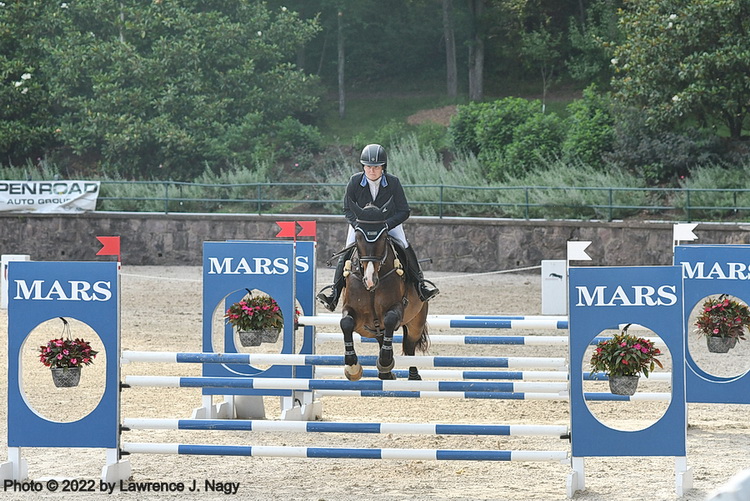
by Nancy Jaffer | Jul 1, 2022
The Essex Horse Trials, which began in 1968, is a piece of eventing history that always looks toward the future. In a bold move, the competition’s latest version was showcased this weekend at two venues–Moorland Farm in Far Hills and the U.S. Equestrian Team Foundation’s Gladstone headquarters.
Cross-country is being held Saturday at Moorland, but the Gladstone portion, staged today, offered dressage in the North Field and show jumping in the main ring. It was a homecoming; Essex hasn’t been at the Team since 1998, after which it embarked on a 17-year hiatus until it was revived at Moorland in 2017.
Moorland has great cross-country footing, but no all-weather rings, so putting on two segments at Gladstone was the answer to that situation. And there was a bonus: For many riders who had never ridden at the facility that is famous around the world, the experience was unforgettable.
“It’s like a horse show at the queen’s castle. It’s wonderful,” said Matthias Hollberg, a native of Germany who is the husband of last year’s Essex Open Preliminary winner, Hannah Sue (formerly Burnett).
Morgan Rowsell, co-organizer of Essex with Ralph Jones, noted, “The riders really felt like it was a special place to be. You don’t see things like this in this country.”
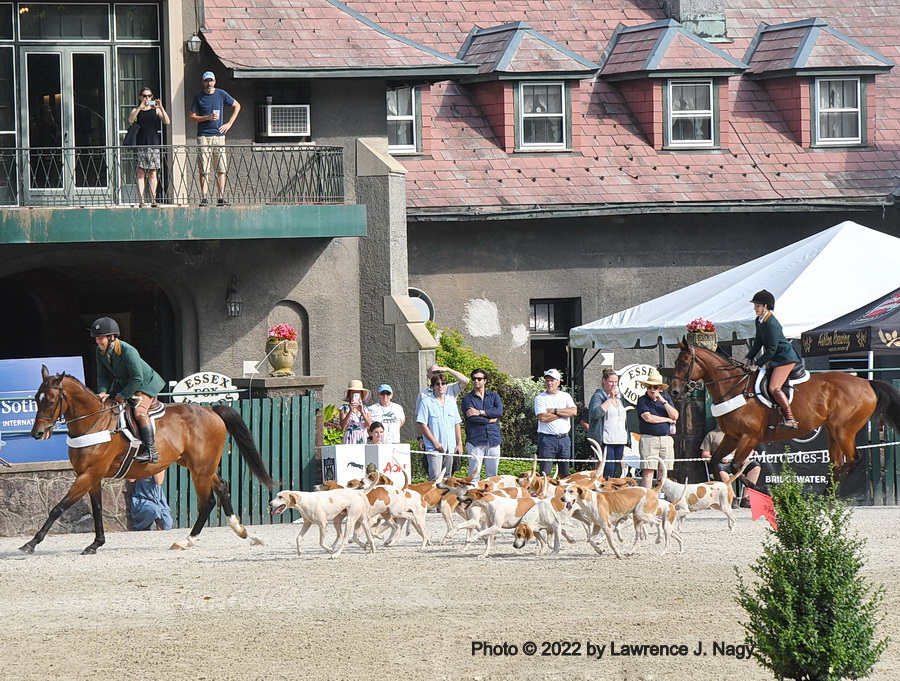
An exhibition by the Essex Fox Hounds added to the atmosphere before show jumping. (Photo © 2022 by Lawrence J. Nagy)
As Hannah Sue noted with a smile, “Why do you have to go to England when you can just go to Essex and compete at the queen’s castle?”
She is leading the featured $10,000 Open Preliminary division with Stakkato Bronx on 20 penalties. Matthias is fourth on 26.4 with J, who is a developing eventer. Primarily a show jumper, Matthias is happy to bring along horses and then hand them over to his wife.

Matthias Hollberg and J. (Photo © 2022 by Nancy Jaffer)
“Matt does such a good job with the horses that are sensitive and a little bit tricky,” said Hannah Sue.
“Even though he’s a small horse,” she commented about J, “he was quite strong. I think we sorted that out pretty well, hopefully. When I rode him he felt quite big for me, so Matt’s been getting him going a big softer. He’s very talented.”
Hannah Sue thinks J might be a 5-star horse someday.
Jacqueline Mars, a great patron of eventing owns Stakatto Bronx with Christa Schmidt. Mars Equestrian is among the presenting sponsors of Essex, along with AIG, Peapack Gladstone Bank and Running S Veterinary Services.
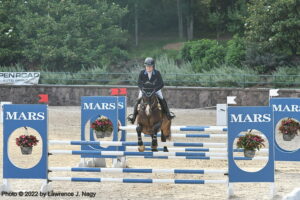
Hannah Sue Hollberg and Stakkato Bronx. (Photo © 2022 by Lawrence J. Nagy)
Riders and horses coped well with temps in the high 80s, but as Open Preliminary competitor Matthew Bryner observed while looking down at his horse’s braids, “Even the rubber bands are melting.”
But the heat is just something you have to take in stride when competing during the summer. Dealing with the weather all too often is a big part of eventing.
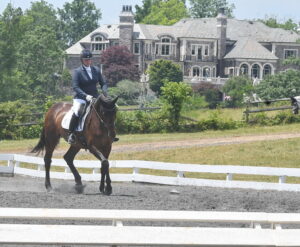
It may have been hot for dressage, but Lauren Chumley had a cool backdrop with Atlanta B. (Photo © 2022 by Nancy Jaffer)
An electrical storm, well-timed because it happened before the featured Prelim jumping, sent everyone scurrying into the solid walls of the stable.
The weather cleared afterward, and a good-sized crowd watched from the stands while the 150 people at the VIP tent enjoyed a great view of the arena action, aided by sliders, fries and a choice of beverages.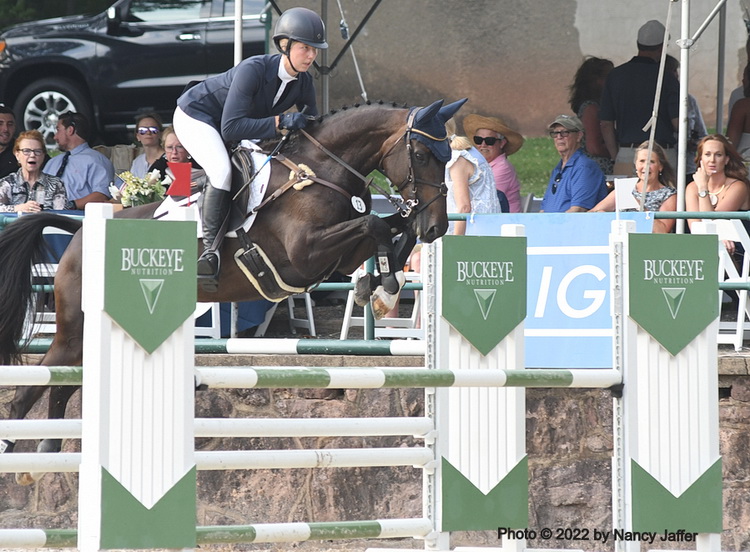
Partiers in the VIP tent could practically reach out and touch the horses during show jumping. (Photo © 2022 by Nancy Jaffer)
Horses stayed overnight in the historic stable before shipping to Moorland about seven minutes away. Lila Gendal of Vermont enjoyed keeping her horse, off-the-track thoroughbred Tropical Cognac, in a stall that had been inhabited by famous horses over the decades.
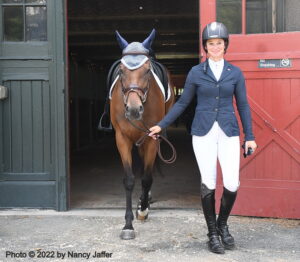
Lila Gendal enjoyed her time in the stable at the USET Foundation. (Photo © 2022 by Nancy Jaffer)
“This is my first time here,” she said, “but I grew up riding with Denny Emerson (a member of the U.S. Equestrian Team) so I’ve heard about this place for years. So to come here is just incredible. You can feel the history. I’m very happy to be here.”
For results of Day 1, click on this link.




































